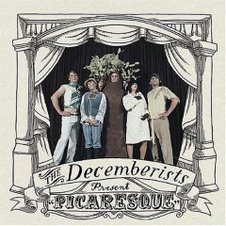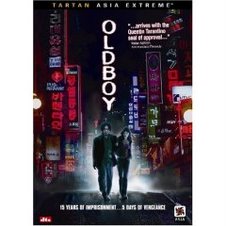Before moving last year, I had always commuted to work via public transportation. It wasn't always fun having to check the subway seat for urine, but it did have certain advantages. Leaving the driving to someone else, I could read books. In fact, the majority of my reading time came during my morning and evening hour on the train.
Now I live in the land of cars, and I have to drive 40 minutes to get to work and sometimes as long as an hour to get home. Sitting in gridlock for an hour and a half each day can get pretty old, but it's even worse when you feel like you're just wasting the time. In the beginning, I listened to NPR obsessively, but there are only so many stories I can listen to about Hurricane Katrina, the Bush White House, and the fascinating subject of porches. I had to find a more productive use of my commute.
Finally, about a month ago, I had an epiphany: I could check out audiobooks from the library and listen to them while I drove. There are so many books that I want to read, and I know I'll never get to them all. This is the perfect way to be able to get some "reading" done while sitting behind the wheel.
Audiobooks aren't perfect. You are at the mercy of the narrator's voice, which all too often is inflected with obnoxious mannerisms or over-the-top accents. Also, it's a lot easier to follow a complex thought on the page than to listen to it read aloud. Sometimes, when someone cuts me off in traffic and I'm cursing at them through my windshield, I'll completely tune out and have to rewind the CD to get my bearings again.
Since I don't get as much out of books on tape, I keep to strictly non-fiction. I figure it's kind of like attending a lecture in college. It doesn't matter if I don't absorb every word as long as I get the gist. So far, I've already listened to three books on CD: Stephen Greenblatt's Will in the World: How Shakespeare Became Shakespeare, Truman Capote's In Cold Blood, and most recently, Jon Krakauer's Under the Banner of Heaven: A Story of Violent Faith.
I had never actually sat down and read Under the Banner of Heaven, though I had skimmed through it extensively when it came out in 2003. What surprised me most while listening to the audiobook version is the change in my reaction from then to now. When it came out I was full of righteous indignation even though I hadn't been to church once in the previous five years. I didn't really believe in Mormonism, but I still wasn't certain that it wasn't true either. I had unwittingly retained a vestigial belief and with it a great deal of defensiveness.
My objections at the time were that Krakauer: (a) didn't do enough to distinguish LDS from FLDS, (b) blamed on mainstream Mormonism the actions of a few madmen, and (c) delivered a particularly low blow on Elizabeth Smart. I didn't read the book all the way through (Maude had bought a copy and read it already) because it made me so mad.
Three years on, after losing all of my belief, the book didn't upset me at all. I still think non-Mormons could be confused between the FLDS and LDS, since Krakauer shifts from talking about one to the other frequently. However, I hadn't realized at the time how many of the FLDS in question were born mainstream Mormon and only became FLDS later in life. The Lafferty brothers and Brian David Mitchell were regular Mormons who somehow morphed into violent fundamentalists; this is not something that is acknowledged in most church circles. Because they had been excommunicated by the time they committed their crimes, they are seen as completely unconnected to Mormonism. This despite the fact that these heinous acts were overtly religious in nature and specifically tied to Mormonism and polygamy.
I still think Krakauer missteps badly in his almost casual assertion that Mormonism helped victimize Elizabeth Smart by making her conditioned to accept authority. It's certainly a plausible theory, but it seems unseemly and unnecessary to me to speculate on the mental condition of a sex abuse victim. There is plenty to focus on in the perpetrator and his religious motives for the crime.
Apart from these objections, I thought it was a very compelling book that did a good job of condensing 200 years of church history and highlighting the dangerous fringes of faith. I think a lot of my earlier hostility towards the book stemmed from my assumption that Krakauer was digging through the dirty laundry to try to discredit the church and imply that all of us Mormons were dangerous fanatics. Now I can see that he is simply trying to explain how extremism (in this case Mormon Fundamentalism) can appeal to some people and cause them to justify frighteningly inhumane acts.
There were a lot of things that I simply didn't want to hear or believe about the church three years ago, so it's probably a good thing that I didn't force my way through this book back then. I had to figure these things out for myself first, before I was willing to accept the word of an outsider.
The most important thing is that I learned a lot more in the week or so it took to listen to Under the Banner of Heaven than I would have learned listening to NPR. I think I'll take my pledge drive money and donate it to the library instead. Take that, Terry Gross.
Subscribe to:
Post Comments (Atom)




21 comments:
m,
I think that's true.
If that "certain something" just isn't there, it isn't there. And arguing history and theology isn't going to change that.
Without the inner conviction, the whole of world religion is one big spectacle of people running around yelling "nanoo, nanoo" at the top of their lungs.
But life generally is a bit of a nuthouse.
Best wishes in finding a conviction for the brand of lunacy that suits you best.
Seth R.
I didn't lose all my faith, Ned, but I liked that book. It was painful and traumatic to read, naturally, but I thought he really tried hard to write a fair book.
The only problem I had was how he left out the First Vision. He could even have said, "the crazy Mormon belief that God appeared to Joseph Smith" but he left it out entirely. Why, do you think?
The only deep feeling I had while reading that book besides curiousity as to how outsiders perceive Mormonism is a visceral hatred of the Lafferty brothers.
I really liked his book Into the Wild. Haven't read this one.
I can't listen to audio books. In one ear and out the other. My commute time is strictly for music. Two hours a day, and sometimes it's not enough.
Ned,
Krakauer's book bothered me on several levels (one of which wouldn't apply to an audiobook reading): first, he doesn't foot- or end-note. I realize it's popular history (whereas I tend to read academic history and legal writing, so maybe I just read it with the wrong genre expectations), and he does, right before or after the index (I don't have my copy here, so I don't remember where) list his major sources for each chapter, but at least when he quotes somebody, I'd just as soon know the source of his quotation.
Second, he writes as if he's never met a real-life Mormon in his life. It kind of gets to your issue of Elizabeth Smart. But other things, too, like where he says that Mormons don't see Salt Lake as the center of Mormonism because it's a wicked city of 50% non-Mormons; rather, Utah Valley is the center. I have no doubt someone feels that way but (although I'd assume most who feel that way are Cougar fans in the middle of football season), but I've never met anyone who feels that way.
Also, the writing was crap. I've heard he was a good writer, and my Catholic officemate loved his other books, but even she felt like he didn't put everything into it.
That said, my complaints are obviously generally aesthetic. If it had been better-written aesthetically (my same problem, frankly, as the Da Vinci Code--Brown had a compelling idea, but couldn't put a sentence together to save his life, apparently), and I'd recognized his cultural portrayal of Mormonism, I thought he did a relatively good job summarizing LDS history. Far from perfect, but I he introduced Mormon history to an audience that would generally do its best to avoid any history of a religious group.
m-- I agree. I think it is also a valuable book for a fairly disinterested outside perspective of Mormonism.
Seth-- You once again prove that you are one of the nicest nuts out there.
AnneGB-- I did notice that he left out the First Vision. I wonder if he left it out because Joseph didn't seem to mention it until several years after the fact. At any rate, it does merit a mention.
This book made me want to move to Colorado City with a couple of beefy ex-Marines with rifles and open up a shelter for abused children and wives. I really can't believe that we're letting this kind of thing happen in America in 2006. It's just outrageous. Someone should really do something about it.
Susan M-- Now I know that we can thank, at least in part, California gridlock for your encyclopedic music knowledge. Do you listen to CDs or your iPod? I only have a CD player in my car, so it's a royal pain to listen to my iPod. I think I'd listen to more music if I had an easier way to use my iPod in the car.
SamDB-- That's a fair point. There were a couple incidents in the book that Krakauer presents matter-of-factly, but really are disputed (such as the authenticity of John Taylor's polygamy revelation).
It's funny, when I heard the Provo comment you talk about, I thought he was right on. On further reflection, I'd say that Provo is definitely the center of cultural Mormonism.
As far as Krakauer's writing goes, I tend to agree with you (though it's tougher to judge without actually seeing it), especially listening to this book right after "In Cold Blood." However, I think Krakauer is more interested in getting the story out there, like a journalist, than working too much on the writing.
Ned, thanks for this post. I really thought Krakauer did a good job -- trying to be as sympathetic as possible in depicting the sometimes-violent fringes of Mormonism. I have to say that I learned a lot from the book,
AnneGB, you're right that the First Vision was never mentioned. I think that's because Krakauer wasn't writing about mainstream 20th-century Mormonism. As is well-known at this point, the First Vision was almost totally unimportant in 19th-century Mormonism, even after it was announced. It just wasn't used very much in missionary work or sermons, a couple of pamphlets notwithstanding. The Book of Mormon and ongoing revelation were much more central foci.
As Kathleen Flake nicely argues in her book on the Smoot hearings, the First Vision really came into its important role in Mormonism only after polygamy was disavowed. The First Vision provided a new form of boundary maintenance between Mormonism and America. Obviously, polygamous fundamentalists don't need the First Vision to maintain that boundary, as they still have the practice of polygamy. So, as far as I know, the First Vision has never been terribly important in fundamentalist Mormonism.
In other words, Krakauer may have left the First Vision out because it simply isn't an important part of either of the versions of Mormonism he describes.
The writing was crap? No way. I know writing. It was good writing. I could almost feel myself in the room when they killed Brenda. I read In Cold Blood as well and I feel it was as well done, in his own style, as In Cold Blood. They both scared the manure out of me.
You know, Ned, I felt really violent as well. I was honestly just furious at her husband. Do you know how he is doing? What a wimp to let that happen. I know that's irrational. I know. I still feel it. I find him culpable.
You know, Krakuer explored very well the --I can't think of the word--the way those brothers evolved, their family life. They came from a group of polygamists who live up north somewhere. They're probably still there, which is scary.
Oh, guess what? Not a thread jack, just a sort of boast. Ervil LeBaron's brother's second wife used to live across the street from me. No lie. She's written a book. He used to come see her and it made me nervous because it was when they were killing people. But she was a sad young girl then, 27, I think, with a 12 year old, and six younger kids.
No, I guess she was his sixth wife. TBC. . .
Yup, that was her. She answered my e-mail. How interesting, huh? My neighbors recall being a little nervous that Ervil LeBaron would show up and have a shootout across the street. Never happened.
Thanks for your comment, RT. I had never thought about the First Vision replacing polygamy as the boundary between Mormons and non-Mormons. It is a very interesting idea, especially since it is not a very obvious relationship.
AnneGB-- It is probably ironic that the book made us both feel violent, though at least our violence is directed at some deserving people.
I'm pretty sure that the entire Lafferty family was mainstream Mormon until the brothers began getting into some weird stuff as adults. If I remember the book correctly, their parents were away serving an LDS senior mission when Ron and Dan almost lost them their house by refusing to pay property taxes on it. It's scary that it's not just people from Colorado City and Bountiful, Canada who can become violent fundamentalists.
I still think it's surreal that stuff like the LeBaron killings actually happened. I was too young to know anything about it at the time. Actually, even though I grew up in Utah, I thought Dan Lafferty was just a run of the mill killer until this book came out. I had no idea that the killings were religiously motivated.
Talk about too much NPR crappola, just makes you want to puke. If you have the means, I suggest four wives in separate homes with staggard reproductive cycles such that you spend ovulation week with each. Sort of the human male equivalent of a winning race horse’s retirement plan, luckiest beast alive.
May be, I have to read the book after all. You made me curious, Ned.
Ned, I've been listening to audiobooks for the past 5-6 years. Like you, my commute is about 45 minutes in the morning, and 60-90 minutes in the evening. I probably "read" 15-20 books a year this way. I also usually have a book I'm reading at home (the conventional way), usually a title that is unavailable in an audio format.
It takes a little while getting used to, but in many ways I prefer an audiobook to actual reading. Yes, some of the narrators are annoying, but many of them are FANTASTIC. I particularly like to hear some of the British narrators narrate British fiction or non-fiction/history stuff. You haven't really "read" Dickens or Austen until you've heard it read by a great narrator. They add inflection at just the right place, and make many of the comic moments even more comic. Suffice it to say, I now have a stable of narrators I'm particularly fond of, and will sometimes seek out certain books they've narrated, books I might not have been interested in reading otherwise.
I've actually meant to check out Under the Banner of Heaven on audiobook, but haven't yet.
For those interested in the format, don't listen to the cheap abridged versions. Most libraries have a pretty good selection, and if you're willing to pay a little $$, you can rent online at Books On Tape or Recorded Books, among others.
If you (or anyone) is interested in some great non-fiction I've "listened" to in the past couple of years:
Truman by David McCullough
John Adams by David McCullough
The Rise of Theodore Roosevelt by Edmund Morris
Theodore Rex by Edmund Morris
Endurance: Shackleton's Incredible Voyage by Alfred Lansing
Lindbergh by A. Scott Berg
In the Heart of the Sea by Nathaniel Philbrick
Seabiscuit by Laura Hillenbrand
Devil in the White City by Erik Larson
Guns, Germs, and Steel by Jared Diamond
A Short History of Nearly Everything by Bill Bryson
A Walk in the Woods by Bill Bryson
In a Sunburned Country by Bill Bryson
Founding Brothers by Joseph J. Ellis
And many more... And don't get me started on fiction...
One more recommendation...
I've meant to read In Cold Blood for a long time now, but haven't yet. How was the reader? Do you remember which version of the book (as in Books on Tape or Recorded Books or some other company) it was?
The other classic "true crime" book is The Executioner's Song by Norman Mailer. I think it won the Pulitzer. In any case, besides be extremely well-written and interesting, it has the added interest of having almost all of the narrative take place in Utah (much of it at the Utah State Prison) and the crimes being committed in the Provo/Orem area.
Things change so quickly online that it's nice to have certain personalities that will never alter. Steve EM will always be Steve EM.
It's nice to see you around, Hellmut. I hope you've recovered from your campaign work.
Matt-- Thank you for the recommendations. I was a little nervous that I'd burn myself out on audiobooks but you reassure me that this can be a long-term solution to my boring commute.
The versions I listened to of "Under the Banner of Heaven" and "In Cold Blood" were both narrated by Scott Brick. He seems to be a pretty prolific narrator, so you're probably already familiar with him. I didn't mind his work with UtBoH, but I can't say that I liked his version of In Cold Blood. He does the main characters in different voices, which certainly makes them memorable, but I found it off-putting. Maybe I'm just getting used to listening still.
My local libraries have a great selection of regular books, but the selection of audiobooks is a little slim. I'll wait till I've exhausted their stock before I explore other options. Apparently, you can connect through their website and download audiobooks for free.
I just finished "Jarhead" today and checked out "Beyond Belief" by Pagels.
Oh, come on Ned. Everybody knows you, Stephen M et moi are the same person. And yes, I realize that perfection would actually be more than four wives given periodic pregnancy downtime, but for those with the means, it's a good start.
But seriously, I've never understood the polygophobia denial amoung LDS. It's part of Mormonism, albeit not LDS Mormonism, and remains a common practice throughout the world. Why deny our past and the breakaway groups we've left along the way?
Isn't highlighting and focusing on the violent aspects of any faith (truly non-unique to Mormonism) a distortion of reality?
This is where portrayal of polygamy in the media has gone wrong. It's the most sensational, violent, sexy and salacious portions that make the story- creating a departure from the broader picture.
Do we portray Southern Baptists by the actions of the KKK and imply these ideas are inherent in Christianity? Do we argue that Protestantism was responsible for the reprehensible treatment of Irish Catholics?
Of course not.
Any religion can be taken to the extreme.
Good point, Tom.
Hmmm, I have to disagree with you, Tom. I think it's important to get as much media attention on these pedophilic freaks (i.e. the polygamists) as possible. I don't really care if it even mentions WHY they think they're justified practicing polygamy (i.e. Joseph Smith). I think it's in everyone's best interest to try to stamp out these reprehensible crimes that are so rampant in polygamous communities.
As for the other topics you mentioned, I think they all have been suggested and explored. As much as we may wish it weren't true, polygamists believe in Joseph Smith and Brigham Young and especially Section 132. They're our cousins, like it or not.
Yeah, but you can't judge your family by your screwed up cousins. You have to look at the whole of of.
annegb,
Are you saying men suffer the same weakness as stud horses; they risk going crazy if bred too often?
Post a Comment